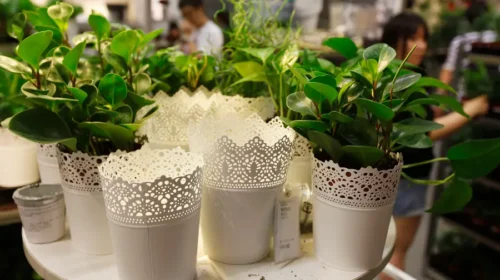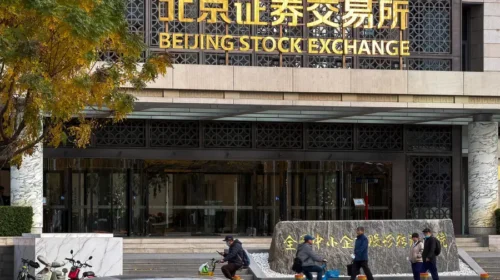Weak China market, potential Trump tariffs leave Man Wah sitting uncomfortably

The sofa maker has yet to catch a major cold from China’s property market slowdown, reporting its profit rose slightly in the first half of its current fiscal year
Key Takeaways:
- Man Wah reported its revenue from China fell in the first half of its current financial year, but that was partly offset by strong performance overseas
- Despite reporting profit growth, the sofa maker has little room left for additional gross margin expansion, and could be vulnerable to future U.S. tariffs under Donald Trump
By Bai Xinrui
The cold winter sweeping through China’s property market has wreaked havoc on many supporting industries, from appliance and furniture makers to building material suppliers. While it’s not immune to such headwinds, sofa maker Man Wah Holdings Ltd. (1999.HK) bucked the tide by reporting a mild profit increase during the first half of its fiscal year, even as most of its peers suffered declines or lost money.
As if to show its ability to weather such tough times, the company even maintained its longstanding policy of making a dividend payout ratio of more than 50%.
Founded in Hong Kong in 1992 by the Chairman Wong Man Li and listed since 2010, Man Wah has gradually built presences on the Chinese mainland, as well as in Europe, the U.S., Japan and South Korea. Its Cheers brand of sofas have been global best sellers for five consecutive years, with a domestic market share of about 60%, and it consistently ranks among the top three brands in the U.S.
Still, the company’s revenue fell 7.1% year-on-year in the first half of its fiscal year though September to HK$8.31 billion ($1.1 billion), as revenue from China, which accounted for nearly 60% of the total, dropped 17.2% to about HK$5 billion. Man Wah recognized that consumer confidence in China is slipping, without prospects for much improvement anytime soon, which is pressuring both its sales and prices.
Fortunately for Man Wah, its overseas business performed well enough to partly offset the weak Chinese market. Revenue from North America, which accounted for 26% of its total, increased 5.7% year-on-year in the six-month period to HK$2.15 billion. Europe and other overseas markets, which accounted for the remaining 8.8% of revenue, performed even better with a 37.7% gain to HK$733 million.
Boost from lower raw material prices
While times are tough for consumers in China, the same sluggish economy behind the difficulties is also providing some relief to Man Wah. Nonstop deflationary pressures in the nation’s manufacturing sector have caused China’s Industrial Producer Price Index (PPI) to fall for 25 straight months.
That’s benefited Man Wah by trimming its raw material costs, mainly for leather and steel, which account for more than 50% of its total costs and fell by 5.3% and 8.3% year-on-year, respectively, in the first half of its fiscal year. Those declines, combined with a 10.5% drop in production expenses, caused Man Wah’s cost of goods to fall by 7.7%, which boosted its gross margin by 0.4 percentage points and net margin by 1 percentage point in the period. Such declines allowed Man Wah to keep growing its profit, albeit by a slight 0.3% year-on-year to $1.14 billion, despite its overall revenue decline.
Man Wah has always been a generous dividend payer, generally distributing more than half of its profits to shareholders. The company said it plans to pay an interim dividend of HK$0.15 per share, which, based on its interim profit of HK$0.2937 per share, represents a payout ratio of 51%. So, at least shareholders looking forward to dividends will be happy.
Man Wah’s solid performance in recent years has been mainly driven by recliner products. According to a survey in the Upgrade Life for All White Paper II, 70% of respondents considered “lying on the sofa” as their preferred way to rest after going home. Unlike traditional sofas made of fabric and solid wood, recliners are moderately soft and more comfortable and have higher tilt angles, up to 110 to 150 degrees, to reduce the load off the back and shoulder muscles.
Recliners find fans overseas
Man Wah sells its recliners mainly overseas, especially in the U.S. With the Federal Reserve entering an easing cycle characterized by lower interest rates, mortgage rates have also fallen. That is boosting property sales, with existing building sales growing 3.4% in October alone on a month-on-month basis. Concurrent stock market gains to new record highs, along with strong consumer sentiment, led Man Wah to say that U.S. demand will continue to be strong.
The company’s management is also bullish on Europe, believing its growing market share there will help to offset declining prices. It estimated that sales in the European market will continue to record a double-digit increase in the next six months.
At the same time, many analysts are predicting that tariffs on Chinese products will ramp up again after Donald Trump returns to the White House in January as the new U.S. president. Man Wah is somewhat prepared for that, saying it has expanded its production to several overseas bases, including Vietnam and Mexico. But such moves could still be futile, since Trump has previously said he may slap substantial tariffs on goods from Mexico and Vietnam as well. Any such move would undoubtedly deal a major blow to Man Wah.
No relief in China
At the same time, Man Wah is unlikely to find relief in China anytime soon, despite Beijing’s recent moves to support the economy and revive the property market. The Fitch ratings agency recently said it expects that the price of existing homes will continue to decline in the short term, while new housing prices still face huge pressure. Such pressures, coupled with weak stock markets, will almost certainly keep consumer confidence low in China, which won’t do any favors for Man Wah’s business in its most important market.
Meanwhile, Man Wah management also noted it’s unlikely to get any more boost from falling material prices, which have now bottomed out. The company is also feeling pressure to lower prices, meaning its margins will soon come under pressure.
Overall, Man Wah’s ability to keep growing its profit is admirable, even if it is likely to soon come under pressure due to heavy reliance on a furniture market that’s closely tied to China’s property sector. In the meantime, its overseas business is also vulnerable due to the potential for U.S. tariffs. Man Wah’s dividend yield is now 6.8%, compared to less than 5% among most export-oriented stocks, according to Bloomberg. Such generosity could help support the company’s stock going forward if it continues to pay out at that rate.
To subscribe to Bamboo Works weekly free newsletter, click here





